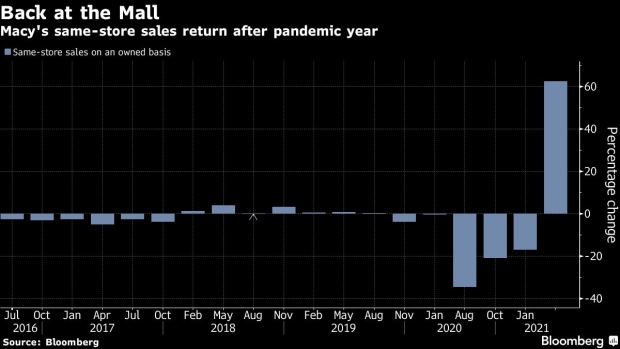May 18, 2021
Macy's boosts forecast as return of travel fuels shopping
, Bloomberg News
Macy's Closing 125 Stores, Cutting 2,000 Jobs in Restructure
Macy’s Inc. posted first-quarter sales that outpaced Wall Street’s expectations and raised its earnings forecast for the year as the reopening economy helped drive shoppers back to the mall.
Comparable-store sales, a key retail metric, soared 62.5 per cent for company-owned stores from a year ago, Macy’s said Tuesday in a statement. That’s above the 45 per cent gain expected by analysts, according to data compiled by Bloomberg. Still, the quarterly sales figure remained down from the same period in 2019.
“Our customers are ready to spend and demand is rising,” Chief Executive Officer Jeff Gennette said on a conference call. He cited stimulus payments and vaccination rates driving results. These are “all encouraging signs as consumers move towards a post-pandemic lifestyle and start to spend more for in-person activities, travel and events.”

Retailers, particularly apparel-based ones, are reporting big jumps in sales as they lap the pandemic lockdowns of a year earlier. Macy’s results, in particular, also point to a rebound in reopening-specific categories, with travel recovery driving luggage sales and return-to-office creating demand for work attire such as dresses.
The trends, along with success of its Polaris turnaround plan, led Macy’s to boost its outlook for the year. It now sees adjusted earnings of $1.71 to $2.12 a share this year, well above the 40 cents to 90 cents it had been estimating before.
“We don’t see this as a short-term pop,” Gennette said. “There are pent-up demand opportunities in our categories that give us confidence for accelerated profitable growth in 2021 and beyond.”
The shares rose less than one per cent at 9:51 a.m. in New York on Tuesday. Macy’s stock rose 70 per cent this year through Monday.
The company sales outperformed expectations across all three brands: Macy’s, Bloomingdale’s and Bluemercury.
“Macy’s has exceeded expectations,” Neil Saunders, managing director of GlobalData, said in a note. “These are good results which show the company is making up some ground that was lost during the pandemic.”
Still, he cautioned that structural issues persist, from merchandising to service. And with stimulus giving a short-term lift, he said, “some of the growth being posted is not sustainable.”
Macy’s said its Polaris transformation -- a strategy that aims to boost the company’s online sales performance, improve its loyalty program and build up higher-margin private brands -- played a key role in the results.
Like many company, Macy’s is grappling with supply chain issues, including port congestion. Gennette said the retailer is changing its freight strategy and pushing for earlier deliveries. He expects that these strains will be alleviated in the coming weeks.







